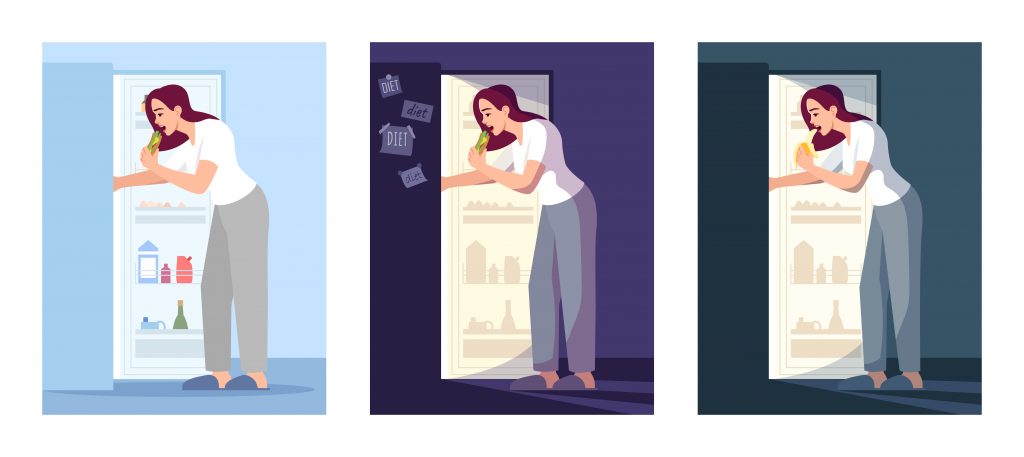Sarah Dalman, a 5th year dietetics student at UBC, shares her tips on managing stress eating.
Sarah's interest in nutrition, science, and using evidence-based practices to promote good health has led her to pursue a career in dietetics. She is passionate about empowering others to use food as a vehicle to support overall physical and mental health.
Picture this – it’s the night before an exam, you’re getting some last-minute studying in, and you’re stressed. You had dinner an hour ago and don’t feel hungry, but you reach for that bag of chips to snack on while flipping through your readings. Next thing you know the bag of chips is empty, you’re feeling sluggish, and your stress about tomorrow’s exam is still very present.
It’s normal to turn to food as comfort, especially when you’re feeling overwhelmed or frazzled. Unfortunately, stress eating often leads to feeling overly full or sluggish, and doesn’t do much to resolve the underlying issue. With exam season quickly approaching, everyone’s feeling more anxious. So how can we maintain good eating habits and prevent stress eating?

What is stress eating?
Stress eating is a type of emotional eating that can be defined as eating for reasons other than physical hunger. We know that stress can impact peoples’ eating habits1. Usually, this means you’re not aware of your hunger and fullness cues. You’re eating when you’re not hungry or eating past the point of fullness. This is because when we stress eat we’re eating as a way to distract or soothe negative emotions.
We also know that people who are stressed are more likely to choose foods that taste good – meaning we’re reaching for foods that are higher in fat and/or sugar, like chocolate, chips, and ice cream2. Although these foods can fit into a healthy diet, they are often less nutrient-dense and don’t provide the fuel that we need to get through our long study sessions. Having large quantities of these foods that are high in fat and/or sugar may also cause you to feel restless, agitated, sluggish, and may cause your energy levels to crash shortly after eating. In short, the foods we reach for when stress eating may be making our stress worse in the long run.
How do I know that I’m stress eating?
To identify stress eating you have to tune into your physical hunger and fullness cues. Tune into your intuitive eating mindset and ask yourself what it feels like to be hungry and to be full. Everyone is different, but some examples of hunger can be stomach growling, low energy, fatigue, headaches, shakiness, or feeling cranky. Signs of fullness include the resolution of hunger cues, feeling satisfied, or a pressure/tightness in your stomach. To learn more about hunger and fullness cues check out this blog post on the 10 principles of intuitive eating. Once you’re able to identify your physical hunger and fullness cues you’ll be more equipped to identify when you’re stress eating.
One way to do this is by using a hunger scale that helps you quantify your feelings of hunger or fullness. Before you eat, check in with your hunger scale, if you’re above a 6 that may be a sign that you’re stress eating instead of eating out of physical hunger.
How to prevent stress eating?
1. Eat well and eat enough during the day.
The first tip in managing stress eating is to make sure you’re eating enough nutritious food during the day. Try to choose well-balanced meals and snacks to keep your energy levels up throughout the day. Additionally, try to avoid skipping meals. For most people, this means eating every 3-4 hours, but tune in to your hunger cues and do what works for you. You’ll be more likely to eat past your fullness or choose foods that aren’t as nutritious if you haven’t eaten enough during the day. During exam season it can be harder to make time to eat, so try scheduling in time to have meals or snacks every few hours, to ensure you’re keeping yourself nourished. If you’re looking for more ideas on what to eat to fuel your body during finals check out this blog post.
2. Get enough sleep
We know that people who get fewer than 7 hours of sleep are more likely to overeat, regardless of whether or not they’re in a state of stress3. Think about it, the more tired you are, the less energy you have to tune into your hunger and fullness cues. Additionally, your body is going to crave foods that are higher in sugar and fat to give you that instant boost of energy. Set yourself up to maintain healthy eating habits by prioritizing a good night’s rest during this busy exam season.
3. Keep a food journal
Stress eating is a way to soothe or distract from negative feelings. One way to become more aware of stress eating and help curb it is by keeping a food journal. Take a few minutes every day to write down what you eat, how you felt, and what you were doing before eating. This will allow you to identify patterns and triggers that cause you to stress eat. For example, on a normal day you might have a scoop of ice cream after dinner as dessert, but the night before an exam, the added pressure and nerves means your scoop of ice cream turns into a pint. Becoming more aware of your triggers to stress eat will allow you to be more equipped to prevent them.
4. Use other tools to cope with stress
So you’re now able to identify what triggers your stress eating, and you know that it won’t make you feel better in the long run, so what can you do to manage your stress during exam season? There are plenty of other coping mechanisms that will not only distract from the stress, but may even help reduce it. Some examples are going for a short walk, chatting with a friend, or practicing some deep breathing techniques. Find something that works for you and fits into your busy schedule, to try in place of stress eating when these triggers come up.
5. Be kind to yourself
The most important thing is to know that stress eating is normal, and sometimes it’s okay to eat for reasons other than physical hunger. Food is more than just a source of nutrition, it’s a source of comfort, a vehicle for socialization, and an important part of culture and traditions. So it’s okay to enjoy that late-night pizza run with your roommates after a long night of studying, or the good luck cookies that your mom baked. If you’re not feeling physically hungry, ask yourself if eating will make you feel better emotionally, socially, or mentally. If the answer is yes and the food will provide a source of comfort, then give yourself permission to eat. To learn more about how to use food and eating as a form of self-care check out this blog post on becoming an intuitive eater and visit our webpage for the NourishU intuitive eating journey. Exam season is hard, don’t make it harder on yourself by feeling guilty about your eating habits.

And remember
Stress during exam season is an unavoidable part of the process but stress eating doesn’t have to be! Set yourself up for success by following the above recommendations and remember to be kind to yourself through the whole process.
References
- Macht M, Haupt C, Ellgring H. The perceived function of eating is changed during examination stress: a field study. Eat Behav. 2005 Feb;6(2):109-12. Abstract available from: https://www-ncbi-nlm-nih-gov.ezproxy.library.ubc.ca/pubmed/15598596
- Costarelli V, Patsai A. Academic examination stress increases disordered eating symptomatology in female university students. Eat Weight Disord. 2012 Sep;17(3):e164-9. Abstract available from: https://www-ncbi-nlm-nih-gov.ezproxy.library.ubc.ca/pubmed/23086251
- Dweck JS, Jenkins SM, Nolan LJ. The role of emotional eating and stress in the influence of short sleep on food consumption. Appetite. 2014 Jan;72:106-13. Abstract available from: https://www-ncbi-nlm-nih-gov.ezproxy.library.ubc.ca/pubmed/24148250







